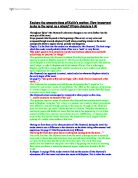Write a critical appreciation of the following passage, suggesting how far its styles and concerns are characteristic of the novel as a whole.
Elysse Jones 13cl
Write a critical appreciation of the following passage, suggesting how far its styles and concerns are characteristic of the novel as a whole.
In this passage, Jane Austen’s style mostly contains a combination of language, with the third person and past tense, associated with the narrator’s perspective, irony and tone. Her style is direct and subtle, while noticeably dropping hints of what is truly happening, throughout the novel. Her style also reveals concerns such as mystery, suspicion and humour.
The passage opens with a very descriptive paragraph, which sets the scene. It is subtle and to the point, creating an instant emotion, while unobtrusively setting up objects of satire. For example when referring to Emma’s always doing what she liked. This is typical of Jane Austen’s style; she is simple and direct, and similarly sets up the character of Emma at the beginning of the novel. This also creates an immediate effect; that Emma is arrogant and almost too perfect, with everything one could wish for. Another aspect of Jane Austen’s style is to allow the reader intimate access to a character's thoughts, “Emma could not but pity such feelings, whatever their origin…” which show Emma’s true personal feelings, which would be quite different to her lines of dialogue. The novel is mostly in third person, but through the eyes of the main character. Because Emma is the domineering character, the reader’s position is very close to hers, and therefore, understanding her thoughts and emotions allows the reader to become compassionate towards her faults, and keep sympathy with her. If the view was through any other character’s eyes, Emma would be seen in a much harsher, unforgiving light. Irony of this sort is often used in Emma in creating the reader’s double vision of the heroine. If we did not know Emma’s inner thoughts, or saw the events through the eyes of another, we would have a very different, less sympathetic view of her.








